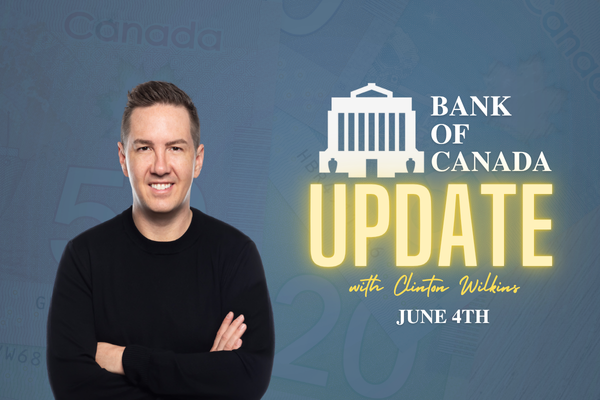Clinton Wilkins joins Todd Veinotte on 95.7 News Radio to discuss The Bank of Canada holding its key policy rate at 2.75%, marking the first pause after seven consecutive cuts.

News Update: 95.7 News Radio – September 20th
Rob Snow and Clinton Wilkins discuss the impact of the US Federal Reserve’s 50 basis point interest rate cut on mortgage rates, which have been falling, and what this might mean for Canadians.
Rob Snow
the US Federal Reserve Board cut interest rates this week by 50 basis points, and that’s a big deal, because those interest rates set by the US Feds go a long way to determining mortgage rates, which are finally starting to go down. That will be welcome news for those looking for a home loan. So what’s available in terms of rates? Clinton Wilkins is back from the Clinton Wilkins Mortgage Team in Dartmouth, Nova Scotia, good to hear from you!
Clinton Wilkins
Thanks for having me Rob!
Rob Snow
How much have rates come down?
Clinton Wilkins
I can tell you, obviously variable rates have continued to go down. Rob there have been very, very popular with borrowers. Borrowers have a very optimistic outlook now that the rates are going to continue to go down, really, for the next 12 to 18 months. So a lot of borrowers are moving towards a variable rate mortgage, but consequently the fixed rates have also started to go down. Bond market has had some pressure, and we are seeing fixed rates that are edging closer and closer to being in the 3% range. Still, most fixed rates today are starting with a four but much better than it was four months ago, or six months ago, or a year ago. We were at upwards of 7% before, the rates really started coming down
Rob Snow
So given what we’re hearing from the central banks, both in the United States and in in Canada, what economists are saying you would expect further declines in mortgage rates? Yes, Clinton?
Clinton Wilkins
I would 100% think that rates are going to continue to go down. I guess the one question that we don’t know Rob is, how quick are they going to go down? And for a borrower who is getting a mortgage, I think the right time is the right time for them. I will say to you that there are some very good deals in terms of pricing right now. We need to remember that the Big Five, they have their year end at October 31st so as far as mortgages being “on sale” there certainly is some very aggressive pricing, if you can close very quickly and before October 31st.
Rob Snow
Okay, the rates where they are now, compared to say where they were at the beginning of the year. Is that sparking more interest from home buyers? Now? What’s your experience?
Clinton Wilkins
Certainly a lot of optimism, and I think there certainly is more interest across the country, I can tell you, still in markets like Ontario, and BC, things are still tough. The market’s very, very soft. But in Atlantic Canada, where I’m doing business, and in the Prairies, the market’s been very stable, even with the rates being, you know, higher, there’s still people who are doing transactions every day, but when the rates come down, there is a lot more optimism in the marketplace. And I think specifically from first time homebuyers, those folks were really sitting on the sidelines. You know, in reality, the last 12 and 24 months, with the rates being higher, they qualify for less, but there’s certainly more for some homebuyers entering the market. And obviously the news this week from the federal government, with the rules changing on December 15th, that’s providing even more optimism for buyers just looking to enter the marketplace.
Rob Snow
I want to talk about that in a minute, but what I want to get at now is what are popular products for people? What are people inquiring about with you?
Clinton Wilkins
If we’re talking about a high ratio mortgage, I think there’s three most popular rates. I still say variable is very, very popular and would be more popular than it was even a couple of months ago. There’s still a lot of popularity around a three year fixed. And for a three year fixed, we’re looking at in terms of a high ratio mortgage somewhere in the low 4% range. So I think if you’re getting a rate somewhere in that four to nine range, you’re doing pretty good. But historically, Canadians love to take a five year fixed. That’s what we’re kind of trained to do, and that’s what a lot of borrowers are still asking for. And I think for a five year fix with a high ratio style mortgage, you’re still looking in that low 4% range. I think you’d be somewhere around 4.34 give or take, just depending on the institution and when you are funding that mortgage.
Rob Snow
So high ratio meaning you need the mortgage insurance, right?
Clinton Wilkins
Correct.
Rob Snow
Okay, what if somebody is putting 20% down and they don’t need the mortgage insurance? What are those rates?
Clinton Wilkins
I think if you’re putting down 20% or if you’re doing a refinance, the rates would be somewhere in about four and a half percent. So we’re going to be again, plus or minus. It’ll be depending on the amortization. Typically, to get better pricing, a 25 year amortization or less, you’re going to get the best pricing from the institution that you’re going to do business with. There’s a lot of variety out there. Rob and I would say the differences with mortgages are more now than they were before, and I think that’s really why it’s so important for any borrower to seek the advice of an unbiased mortgage professional, especially in these times where the rates are just so vast between different lenders, but even the products, there’s a lot of differences, just even due due to the pricing and options that are out there.
Rob Snow
I’m taking a lot of calls. We’ve talked about real estate, housing affordability, you can imagine, it’s been a very hot topic. And I’ve taken calls from people who look at the Americans and they’re kind of envious, because Americans can lock in at the same rate, never have to renew for 30 years. And they do that. You know, some of them wish, gosh, I wish I could do that here. I guess the longest term is 10 years. In Canada, do you ever get people opting for 10 years?
Clinton Wilkins
Not very often,
Rob Snow
Not very often. No reason?
Clinton Wilkins
The reason being is it’s a long commitment. And in Canada, I think we have commitment issues around mortgage lending. Historically, borrowers are breaking their mortgage somewhere around 40 months. So even those borrowers that are taking a five year term, which is 60 months, are usually breaking their mortgage early. That’s why this year has been really, really interesting. There’s been a cultural shift. I’ve been doing this almost 20 years, and we’ve done over 6,200 transactions, and the bulk, I’m going to say 90% plus, we’re in a five year fixed or a five year variable. So these shorter term mortgages certainly have become more of the fashion of the day, but I think it might be very prudent for borrowers just knowing that so many people do break their mortgages early and right now still around 40 months now, borrowers are holding on longer to their mortgages than they were even 12 months ago. Just with the rates being high, I think people are being more mindful around breaking the mortgage early, especially if they were in one of those very low fixed rate products. They’re really trying to hold on for as long as they can to get the maximum benefit out of that term.
Rob Snow
Okay? So finally, what is your reaction to the new rules around 30 year mortgages and mortgage insurance announced by Minister of Finance this week?
Clinton Wilkins
I think it’s very exciting. You know, let’s think about Ontario and BC, where a majority of the homes are over a million dollars. Borrowers in those markets needed 20% down plus to be able to qualify. Now, starting December 15th, they can get a high ratio mortgage from the Canadian Mortgage and Housing Corporation, Sagen and Canada guarantee for a purchase price up to $1.5 million. I know some of our listeners across the country would be surprised to know that a first time home buyer may buy a home at that price point, but in many markets across the country, real estate obviously has continued to go up, but the rules have not changed. So I think it’s going to be good for first time homebuyers. And to recap, they’ll be able to get an amortization up to 30 years on a high ratio insured mortgage. So this is the first time that these rules have really softened since they were tightened up to really preserve the Canadian real estate market. I think it’s going to be very interesting. I think some people from the outside looking in, think that it might be inflationary, where it’s going to create even more demand on the marketplace, but in many areas across the country, the demand for real estate really has gone down with these rates being higher. So I hope that with new supply coming on board, it will ena
ble more for some home buyers to get into the marketplace. I think with the cap being 1.5 million and the amortization being up to 30 years on a new home and on real estate and on resale. For some homebuyers, I think that’ll be really positive. But also for those borrowers that have purchased a home in the past, they can also qualify for the $1.5 million cap, and they can get a 30 year amortization as long as it’s a new construction property. So there will be a few caveats there. And again, it’ll be important to seek the advice of an unbiased mortgage professional, just where there are so many changes. And if you think that’s something that’s going to work for you, I think it’d be interesting to get pre approval today, and see what that looks like. And they could almost run what the scenario would be again, after December 15.
Rob Snow
Well, you’re gonna have a lot to talk about this weekend. On Mortgage 101, on 95.7 News Radio on Halifax. Look forward to it!
Clinton Wilkins
Thank you very much. Have a great weekend.
Rob Snow
Clinton Wilkins from the Clinton Wilkins mortgage team in Dartmouth, Nova Scotia. I’m Rob Snow. This is News Radio.


